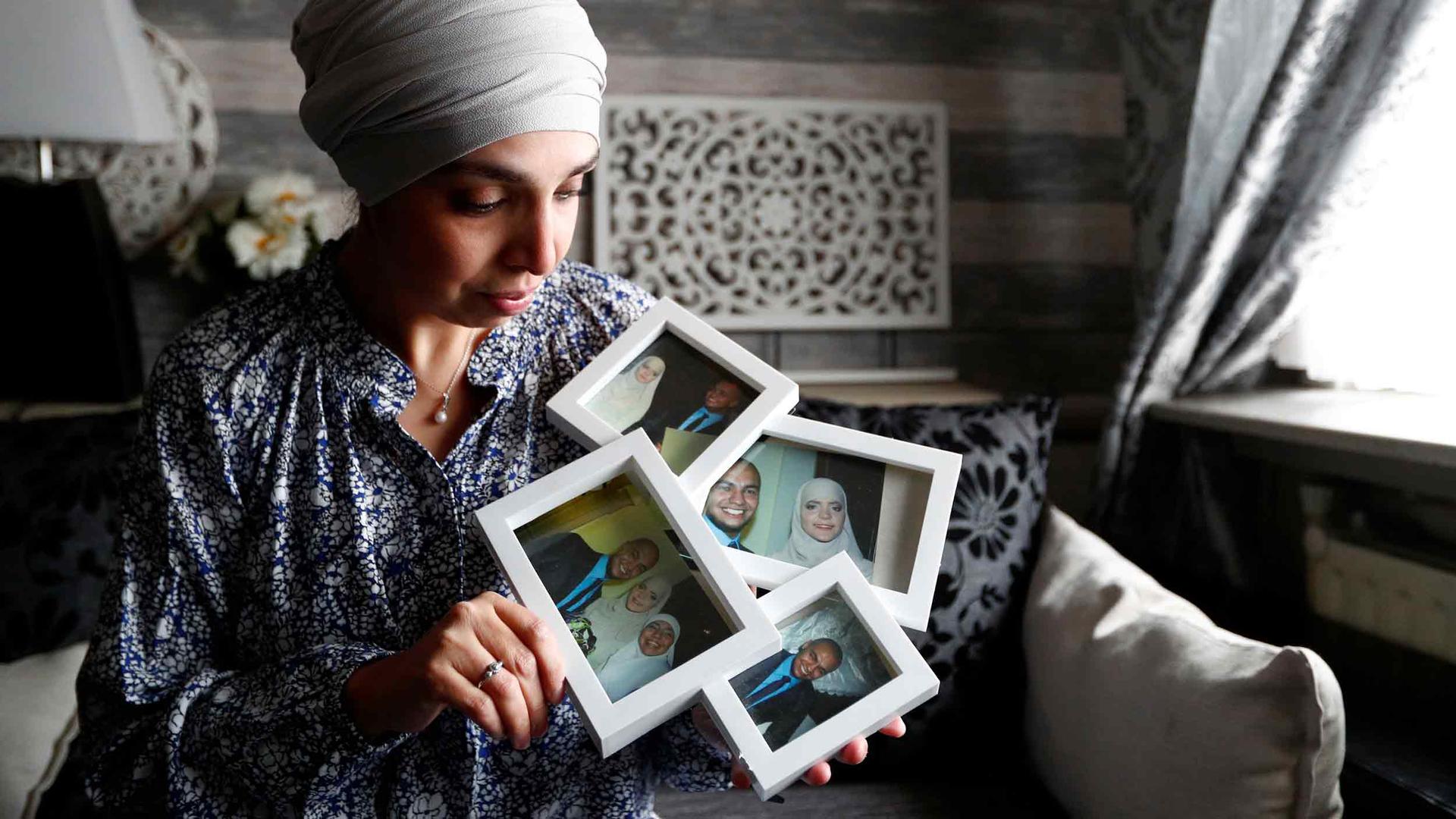Belgian court rules against repatriating mothers convicted of being ISIS militants
Fatiha, who asked her last name not be used for safety of her grandchildren, poses as she holds wedding pictures of her deceased son and daughter-in-law, in her home near Antwerp, Belgium, on Feb. 22, 2019. Fatiha has six grandchildren in Syria.
A Belgian court’s decision to overturn a ruling forcing it to repatriate two Belgian women convicted of being Islamic State militants and their six children from Syria has left their family devastated.
The grandmother of the six children, aged from 11 months to seven years, has been trying for more than a year to bring them back from Syria, where they are being held by US-backed Kurdish militias.
When a judge ordered the state in December to do everything possible not only to bring the children back but also their mothers, she had begun to prepare for their homecoming.
Related: When an American flees to join ISIS, should they be allowed to come home?
Pink and blue backpacks hang under pegs with the children’s names in the hallway of her home near Antwerp ready for them to return to school.
She has been sending their mothers — her daughter Bouchra Abouallal, 25, and step-daughter Tatiana Wielandt, 26, — school material via WhatsApp for them to prepare.
“The girls are devastated, too,” said Fatiha, who has a different last name from her daughter but asked for it not to be used for the safety of her grandchildren, choking on tears over the phone on Thursday.
European nations are wrestling with how to deal with hundreds of suspected militants and their families seeking to return from the combat zone, an issue made more pressing by US plans to withdraw troops from Syria.
There is little sympathy for militants’ families with the trauma of attacks claimed by Islamic State still fresh in many cities, and governments have maintained they cannot act in a region where Kurdish control is not internationally recognized.
Related: Why my fascination with ‘jihadi brides’ hits close to home
‘We’ve already lost enough’
The Belgian government fought the case fearing it would set a precedent. Siding with the state, the Brussels court of appeal ruled that it was not forced “to undertake any act of repatriation.”
Despite winning on Wednesday, Justice Minister Koen Geens said Belgium was still ready to bring back the minors, adding that their mothers had previously said they would stay behind if the children could return.
Wielandt and Abouallal were convicted last year in absentia of being members of Islamic State. Fatiha says she wants them home even if they go to jail.
“The girls have been sentenced to five years in prison. They deserve that prison sentence, and I have never opposed it. I also want them to be arrested, brought here and locked up,” she said last week ahead of the decision.
School friends turned step-sisters, Wielandt converted to Islam to marry Abouallal’s brother Noureddine when they were still teens.
Shortly after, they left with their husbands for Syria — each with a baby — joining more than 400 Belgians who have headed to the conflict zone. Their husbands died with a year of being in Syria. Both widowed in 2014 and each pregnant with their second child, Abouallal and Wielandt returned to Belgium.
A few months later, while Abouallal’s mother, Fatiha, was out of the country on vacation, the step-sisters left again — leaving her heartbroken with an empty house full of toys.
But like other parents across Europe, who have received messages from their children pleading to come home, Fatiha began lobbying the government early last year.
Her relatives are among 17 Belgian women and 32 children being held in Syria, according to security sources.
“We’ve already lost enough. I’ve already lost my son,” she said, speaking about Noureddine. “I want to close this Syrian story forever, and I won’t be able to close it if I take back the children and leave the mothers there.”
The story you just read is accessible and free to all because thousands of listeners and readers contribute to our nonprofit newsroom. We go deep to bring you the human-centered international reporting that you know you can trust. To do this work and to do it well, we rely on the support of our listeners. If you appreciated our coverage this year, if there was a story that made you pause or a song that moved you, would you consider making a gift to sustain our work through 2024 and beyond?
